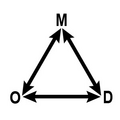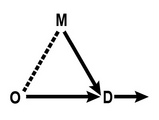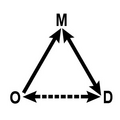Psychological and social theories of mental illness
From WikiLectures
Sigmund Freud[edit | edit source]
- founder of psychoanalysis, a scientifically structured system for understanding mental illness
- dynamic personality strength – psychosexual energy = libido
- pregenital infantile sexuality – focused autoerotic
- development from childhood – oral, sadistic-anal, phallic and puberty
- libido can get stuck in a certain developmental stage, fixation gives a basis for perversions
- libido suppression – neurosis
- other mental life structures – Id, Ego, Superego
- neurosa – confikt Ego and Id
- psychotic disorders – disorders of the relationship between the ego and the environment
- treatment by shifting experiences from unconscious to conscious – psychoanalysis ( only limitedly )
Carl Gustav Jung[edit | edit source]
- Looking for a connection between personal experience and existence of all mankind
- Archetypes - allow an insight of individual fate
- origin schizophrenia - experience of a strong affection that is equal to seeing the mythical medusa
Alfred Adler[edit | edit source]
- neurosa as a person's defense against the feeling of one's own worthlessness - a complex of inferiority
H.S Sullivan[edit | edit source]
- The basis of disorders is in the disorder of relationships between people
California school[edit | edit source]
- He also deals with interpersonal communication, theory of "double ties" - the emergence of schizophrenia is due to interpersonal communication in the family ("parents are always right, do not listen because he is lying")
Behavioural psychotherapy[edit | edit source]
- study of learning and behaviour process
- A neurotic patient has either not learned to the non -adaptive behaviour or is missing the correct formulas
Daseinsanalysis[edit | edit source]
- From the existential philosophy of psychiatrists from Germany, it emphasizes' 'unrepeatability and uniqueness of the human creature', the therapist seeks to empathize with the patient
Existential analysis[edit | edit source]
- emphasizes the desire for the meaning of life , in doubt about the meaning of existence arises, frustration, neurosis and depression
Humanist psychology[edit | edit source]
- tries to understand the inner experiences of an individual and teach him to control the recognized
- Personal development is in understanding and manifesting your feelings
Theory based on the studio of family interaction[edit | edit source]
Develops in the middle of the 20th century
- Family - a small group that is specifically different from other social groups
- Basic interaction - mother -network
- nuclear family
- Balance, sometimes at the cost of a "scapegoat" (scapegoat) - for example, one child is constantly angry, so parents solve his offenses and not disagreements with each other, it can play a role in the development of schizophrenia
Nexal family[edit | edit source]
- Examples of relationships in the family
- closed to the world and the other
- Loss of autonomy of individual members, all must submit to the internal rules of the family
- Lack of individual and family perspectives, suppresses the development of children
- Development of the disease in a nexal family:
- Phase - The child is born with difficulty in expressing their needs, the family is not recognized, the family describes the child as good, trouble -free, but actually ignores its needs
- Phase - The child begins to have the need to show your own self, the effort to escape the family control, is assessed as a "evil" child, the family is looking for the blame outside (friends, school…)
- phase - an individual contrary to family standards is marked mad, the family gets rid of guilt and is looking for a problem outside, a vicious circle
Healthy family[edit | edit source]
- Communication is friendly, misunderstandings do not hide, discuss
- satisfies the emotional needs of the members, open to the incentives from the surroundings
- father and mother - natural authority, child has its own space
- Emotional responses permanent and certain
- It is clear to them that the meaning of life is in themselves
Theory of mental diseases based on social interaction[edit | edit source]
- Mental disease has a more pronounced character of social status
- Three Profit of Psychic Disease (Freud)
- primary - anxiety regulation
- secondary - changes in social situation, escape
- tertiary - benefit for the surroundings (the possibility to care, regret, get rid of guilt)
- The patient's status brings
- benefits - acquittal of duties, the patient is not responsible for his condition
- sanctions - efforts to temporarily condition, treatment
- Psychiatric Stigma '
Links[edit | edit source]
Reference[edit | edit source]
- BENEŠ, Jiří. Studijní materiály [online]. [cit. 2010]. <http://jirben.wz.cz>.






